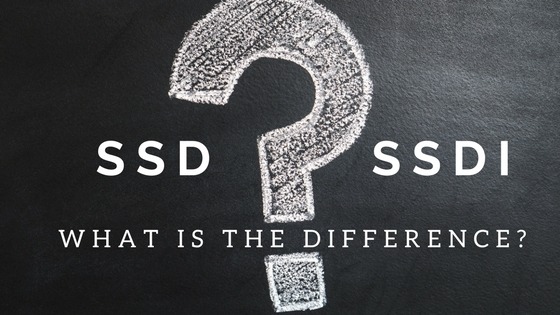The terms SSI and SSDI are very confusing to many people. You will often hear them used interchangeably, but they are entirely two different types of assistance. Understanding all there is to know about these federally funded programs will help to clear up any confusion.

Supplementary Security Income
Supplementary Security Income or SSI is a program that is used to provide extra assistance to those who fall within the parameters of the low-income brackets in America. Typically, the people who receive this type of aid are age 65 years or older. However, there are also many people that suffer from psychological problems too that receive the benefits from this program. Often, when there are medical or mental issues, the need for this support is critical to survival.
The Social Security Administration is in charge of this program. During its inception, it was created to replace similar assistance provided by both state departments and the federal government. It’s not easy to get SSI benefits, though. To be approved, you must be assessed and have a financial need. The requirements are vast and determine who is and isn’t eligible for this assistance. One thing to make a particular note of is the cap on the value of resources that an individual is allowed to have. For instance, a single person cannot go beyond the $2,000 cap. A married couple cannot have any income above the $3,000 cap.
Social Security Disability Insurance
SSDI is an entirely different program that differs drastically from SSI. It’s insured by the American government, which is then funded by federal laws. The Social Security Administration is the organization that handles these funds. This program was designed to help those that have a disability and are unable to find sustainable work to support themselves.
When a physical condition limits a person enough that they cannot provide their needs, then SSDI can provide them the assistance they require until they improve. Not all individuals will develop enough to be removed. To qualify for this aid, a person must not be involved in any substantial gainful activity due to a mental or physical condition. They should have had the condition for at least the past six months, and the condition is expected to last for the next 12 months. The age cap is 65 years on this program, and anyone over this age can qualify for traditional Social Security benefits.
How Do The Two Programs Differ?
There are total two different entities that manage both the SSI and SSDI federal programs. The diversity in the two does go way beyond funding. SSI is supplemental assistance; it’s designed to help those who are already getting financial benefits from the federal government. However, SSDI, on the other hand, is an insurance program that was paid into through a taxpayer’s payroll taxes. A person must “qualify” both with enough time worked, and disability, to receive this aid. Just because a person paid into the SSDI insurance program doesn’t mean they will automatically get approved. The approval process is tedious, at best.
When filing for SSDI, it’s beneficial to have a Social Security disability lawyer to help. The paperwork and guidelines are quite critical. Once you submit an application, you must wait for them to review it, and then they will approve or decline. It takes several months to get an answer from the SSA. Things that can affect your chances of being accepted are:
- The Type Of Disability
- The Speed Medical Records Are Collected
- Your Cooperation
- Reports From Medical Examinations Required by the SSA’s Independent Doctors
- If The Application Is Chosen For Qualify Assurance Purposes
- If You Have A Medical Condition That Allows The Claim To Be Escalated
The Importance Of Having An Attorney Represent Your SSD Case
If you’ve been denied for SSDI, did you know that you have a small window of time to appeal the decision? Because of the deadlines and other requirements, its essential to have a Social Security disability attorney handling your claim. The knowledge of the legal representatives can mean the difference in being approved or a denied.
Call our law offices today at any of our convenient locations and get a free consultation.
McKinney (469) 522-3688
Lewisville (972) 354-4605
Denton (940) 222-4060
Irving (972) 354-4610
Keller (817) 204-0904
Plano (972) 354-4602
You can also contact us online by using our quick contact form.










